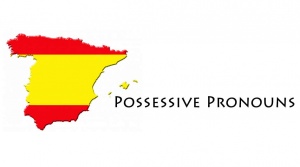Difference between revisions of "Language/Spanish/Grammar/Possessive-Pronouns"
Jump to navigation
Jump to search
Enmanuel0112 (talk | contribs) (Created page with "In Spanish, you use Possessive Pronouns when you want to indicate whose is something. = As Determinant = These Possessive Pronouns are used before the object. The next table...") |
|||
| Line 1: | Line 1: | ||
[[File:Spanish-Possessive-Pronouns.jpg|thumb|none]] | |||
In Spanish, you use Possessive Pronouns when you want to indicate whose is something. | In Spanish, you use Possessive Pronouns when you want to indicate whose is something. | ||
Revision as of 23:33, 25 January 2017
In Spanish, you use Possessive Pronouns when you want to indicate whose is something.
As Determinant
These Possessive Pronouns are used before the object. The next table will show you the Possessive Pronouns as determinant corresponding with the personal pronouns.
| Personal P. | Possessive P. |
|---|---|
| Yo | Mi |
| Tú | Tu |
| Él/Ella/Usted | Su |
| Nosotros/Nosotras | Nuestro/Nuestra |
| Vosotros/Vosotras | Vuestro/Vuestra |
| Ustedes/Ellos/Ellas | Su |
Examples
- Mi mamá está casada con mi papá (My mom is married to my dad)
- Tú y tu hermano son iguales (You and your brother are the same)
- Nuestras mascotas son muy traviesas (Our pets are sleepers)
As Pronoun
These Possessive Pronouns are used after the verb "Ser". The next table will show you the Possessive Pronouns as pronoun corresponding with the personal pronouns.
| Personal P. | Possessive P. |
|---|---|
| Yo | Mío/Mía |
| Tú | Tuyo/Tuya |
| Él/Ella/Usted | Suyo/Suya-De él/ella/usted |
| Nosotros/Nosotras | Nuestro/Nuestra |
| Vosotros/Vosotras | Vuestro/Vuestra |
| Ustedes/Ellos/Ellas | Suyo/Suya-De ustedes/ellos/ellas |
Examples
- La computadora es mía (the computer is mine)
- Los lentes son vuestros (your glasses are yours)
- La manzana es de ella (the apple is hers)
Note #1: in both cases, as the real possessive pronouns (su and suyo/suya) are the same of él/ella/usted and ustedes/ellos/ellas, generally we use "de"+personal pronouns
Note #2: you can use the Possessive Pronoun after the object, (they are very informal)
- La botella tuya tiene agua (your bottle has watter)
- Los libros de ella son muy pesados (her books are very heavy)
